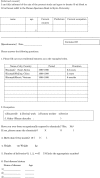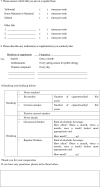Table 2.
Self-reported questionnaire
| A request to donate your blood or breast milk |
| -4 country environmental study- |
| BACKGROUND: At present, it is believed that 300 billion chemicals are registered in the world. Human beings are currently exposed to about 100,000 chemicals in their daily lives. Of those, only a small number of chemicals, that is, about 1,000 chemicals, have been fully risk-assessed, while the remaining majority of chemicals have not been investigated |
| Some chemicals which once were produced actively because of their usefulness are now banned, because of their hazardous effects on human health as well as the ecosystem. For example, DDT and PCBs were once considered useful chemicals but are now banned because of global environmental contamination. After banning their production, the environment is recovering very slowly. As such, long term monitoring studies of environmental contaminants are needed |
| AIM of the CURRENT STUDY: Asian countries in the midstream of globalization are now considered passengers in the same environmental boat. To install precautionary measures to effectively prevent environmental contamination in the Asian area, future trend prediction using computer simulation based on cutting edge theories is now considered very promising. However, only a small number of observations have been available to validate such simulation theories. If the computer simulation results are in agreement with reconstructed data, such a simulation theory is believed to be reliable to predict future levels of environmental contamination. We have established the Human Specimen Bank in Kyoto University (The Kyoto University Human Specimen Bank). Stocked samples (diet, breast milk, and blood) have been collected in Japan, Korea and China since the 1970s. Each sample has information about sampling time and geographic location. We are thus planning to reconstruct the past environment from the 1980s onwards using historical human samples in our sample bank |
| REQUEST to Participants: We have collected human specimens from the late 1970s onwards and stored them in the Human Specimen Bank in Kyoto University. We are going to make full use of these samples to reconstruct the past environment from the 1980s to the present. Although we have stored historical Japanese samples up to 2005 and Korean and Chinese samples up to 2000, we do not have updated samples. Thus we would like to request that you donate 5-ml of blood or ca 30 ml breast milk. These samples will be used to validate computer simulation theories and will be stored for future use in the environmental sciences |
| We hope you understand our aim and will cooperate with our project |
| The 4 countries in collaboration for environmental sciences |
| Director KOIZUMI Akio M.D., Ph.D. (Professor, Kyoto University, Kyoto, Japan) |
| YANG Hye-Ran Ph.D. (Researcher, Seoul Metropolitan Government Research Institute of Public Health and Environment, Seoul, Korea) |
| CHOI Kyung Ho, D.V.M., PhD. (Associate Professor, Seoul National University, Seoul, Korea) |
| WANG Peiyu, M.D., Ph.D. (Deputy Dean, Peking University, Beijing, China) |
| Nguyen Ngoc Hung, M.D., Ph.D. (Professor, Hanoi Medical University, Hanoi, Vietnam) |
 
|
